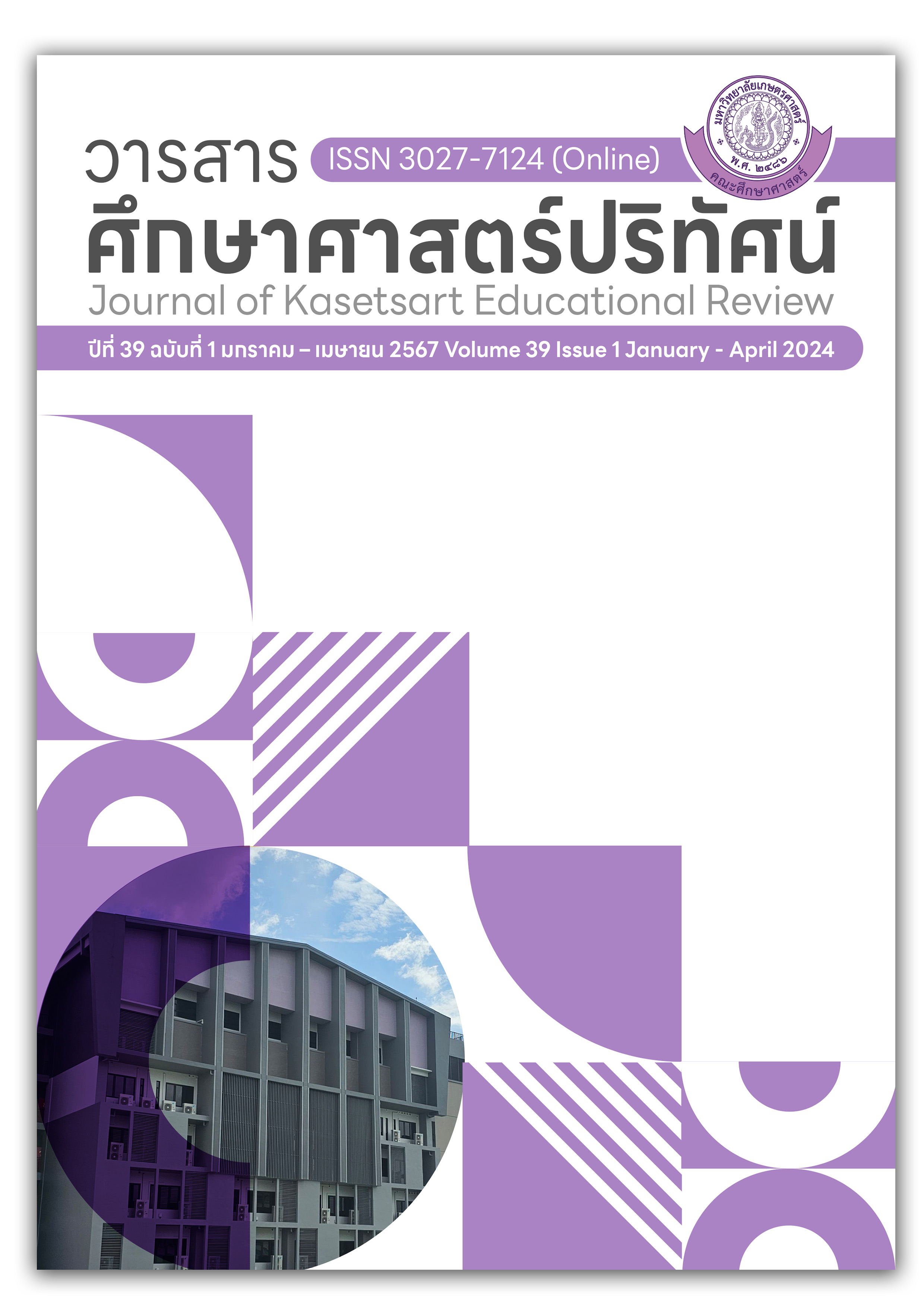การจัดการเรียนรู้โดยให้ผู้เรียนมีประสบการณ์ตามสภาพจริงผ่านการมีส่วนร่วมในชุมชนนักปฏิบัติ เพื่อส่งเสริมสมรรถนะการแก้ปัญหาแบบร่วมมือ
คำสำคัญ:
ชุมชนนักปฏิบัติ, ประสบการณ์ตามสภาพจริง, สมรรถนะการแก้ปัญหาแบบร่วมมือบทคัดย่อ
งานวิจัยนี้เป็นส่วนหนึ่งของการวิจัยและพัฒนาที่มีจุดมุ่งหมายเพื่อพัฒนารูปแบบการจัดการเรียนรู้โดยให้นักเรียนมีประสบการณ์ตามสภาพจริงผ่านการมีส่วนร่วมในชุมชนนักปฏิบัติ และศึกษาผลของการจัดการเรียนรู้ที่ต่อสมรรถนะการแก้ปัญหาแบบร่วมมือของนักเรียน ผู้เข้าร่วมวิจัยเป็นนักเรียนชั้นมัธยมศึกษาปีที่ 6 จำนวน 16 คน โดยดำเนินการวิจัยเป็น 4 ระยะ ได้แก่ ระยะที่ 1 ศึกษาบริบทของชุมชนนักปฏิบัติ ระยะที่ 2 พัฒนากรอบแนวคิดและรูปแบบกิจกรรมการเรียนรู้ ระยะที่ 3 ศึกษาการพัฒนาสมรรถนะการแก้ปัญหาแบบร่วมมือหลังการจัดการเรียนรู้ ระยะที่ 4 พัฒนาและปรับปรุงกิจกรรมการจัดการเรียนรู้ เครื่องมือที่ใช้ในการวิจัย ได้แก่ แบบบันทึกกิจกรรม สมุดพกประจำตัวนักเรียน และแบบวัดสมรรถนะการแก้ปัญหาแบบร่วมมือ ซึ่งผู้วิจัยใช้การวิเคราะห์แบบอุปนัย (Inductive Analysis) เพื่อจัดระดับของสมรรถนะการแก้ปัญหาแบบร่วมมือของนักเรียน ผลการวิจัยพบว่า ในภาพรวมนักเรียนมีสมรรถนะการแก้ปัญหาแบบร่วมมืออยู่ในระดับกลาง ทั้ง 3 องค์ประกอบ โดยองค์ประกอบที่มีการพัฒนามากที่สุด ได้แก่ การสร้างและเก็บรักษาความเข้าใจที่มีร่วมกัน ซึ่งการจัดกิจกรรมทุกขั้นตอน จะเน้นให้นักเรียนสื่อสารการทำงานภายในกลุ่มอยู่ตลอดเวลา การมีส่วนร่วมในชุมชนนักปฏิบัติของนักเรียน จะทำให้นักเรียนได้แก้ปัญหาจริงที่มีความซับซ้อน แต่ในสมรรถนะการเลือกวิธีการดำเนินการที่เหมาะสมในการแก้ปัญหา ยังไม่มีการพัฒนาเท่าที่ควร เนื่องจากสภาพปัญหาจริงมีความซับซ้อนและไม่แน่นอน ดังนั้นครูผู้สอนควรนำนักวิทยาศาสตร์เข้ามามีส่วนร่วมในการจัดกิจกรรมการเรียนรู้ ซึ่งจะช่วยให้นักเรียนมีมุมมองหรือมีวิธีการแก้ปัญหาที่หลากหลายและเป็นไปได้มากขึ้น
เอกสารอ้างอิง
Antonenko, P. D., Hudson, G., Townsend, R., & Pritchard, J. (2011). DEEPER e-learning with environment for collaborative learning integrating problem solving experience (ECLIPSE). In Proceedings of World Conference on E-Learning in Corporate, Government, Healthcare, and Higher Education 2011 (pp. 1811-1816). Chesapeake, VA: AACE.
Billett, S. (1996). Situated learning: Bridging sociocultural and cognitive theorizing. Learning and instruction, 6(3), 263-280.
Care, E., Griffin, P., Scoular, C., Awwal, N., & Zoanetti, N. (2015). Collaborative problem solving tasks. In Assessment and teaching of 21st century skills (pp. 85-104). Springer.
Chanton, M. (2013). A Study of Knowledge Creation Behavior with Online Knowledge Sharing System of Educational Services Community of Practices. [Master of Education Thesis]. Silpakorn University. [in Thai].
Cholsin, J. (2016). The Action Research for Developing STEM Approach Based on Engineering Design Process to Promote Collaborative Problem Solving Competency in Stoichiometry. [Master of Education Thesis]. Naresuan University. [in Thai].
Dixon, R. A., & Brown, R. A. (2012). Transfer of Learning: Connecting Concepts during Problem Solving. Journal of Technology Education, 24(1), 2-17.
Du Plessis, M. (2008). The strategic drivers and objectives of communities of practice as vehicles for knowledge management and medium enterprises. International Journal of Information Management, 28(1), 61-67.
Godemann, J. (2008). Knowledge integration: A key challenge for trans disciplinary cooperation. Environmental Education Research, 14(6), 625-641.
González ‐ Howard, M., & McNeill, K. L. (2016). Learning in a community of practice: Factors impacting English‐learning students' engagement in scientific argumentation. Journal of Research in Science Teaching, 53(4), 527-553.
Hesse, F., Care, E., Buder, J., Sassenberg, K., & Griffin, P. (2015). A framework for teachable collaborative problem solving skills. In Assessment and teaching of 21st century skills (pp. 37-56). Springer.
Independent Committee for Education Reform. (2019). Education Reform in Thailand. Bangkok: [in Thai].
Lave, J., & Wenger, E. (1991). Situated learning Legitimate peripheral participation. Cambridge university press.
Lin, K. Y., Yu, K. C., Hsiao, H. S., Chu, Y. H., Chang, Y. S., & Chien, Y. H. (2015). Design of an assessment system for collaborative problem solving in STEM education. Journal of Computers in Education, 2(3), 301-322.
Mayer, R. E., & Wittrock, M. C. (2006). Problem solving. Handbook of educational psychology, 2, 287-303.
Ministry of Education. (2017). Basic Education Curriculum 2008 (Revised Edition 2017). Bangkok: The Agricultural Cooperative Federation of Thailand Publisher. [in Thai].
Ministry of Education. (2019). The process of developing the competency-based school curriculum in Education. Bangkok: 21 Century. [in Thai].
Naboonmee, P. (2019). Problem-Based Learning for Developing Collaborative Problem-Solving Competency in Rotational Motion Topic for Grade 10th Students. Journal of Education Mahasarakham University, 13(2), 193-205. [in Thai].
Neadratsamee, Ch. (2017). An Action Research on Development of Stem Education Based on Engineering Design Process for Promoting Collaborative Problem-Solving Competencies on Environmental Chemistry of 10th Grade Students. [Master of Education Thesis]. Naresuan University. [in Thai].
Newell, A., & Simon, H. A. (1972). Human problem solving (Vol. 104, No. 9). Englewood Cliffs, NJ: Prentice-hall.
OECD (2017). PISA 2015 Results (Volume V): Collaborative Problem Solving, PISA. OECD Publishing.
Office of the Education Council. (2017). The National Education plan B.E. 2560-2579 (2017-2036). Bangkok: Prikwarn Graphic Company, Ltd. [in Thai].
Office of the National Economic and Social Development Council. (2010). The Eleventh National Economic and Social Development Plan. Nonthaburi: Sahamitr Printing And Publishing Co Ltd. [in Thai].
Office of the National Economic and Social Development Council. (2017). The Twelfth National Economic and Social Development Plan. [in Thai].
Panich, V. (2013). Teacher for Student Flip the Classroom (2nd edition). Bangkok: S. R. Printing Massproducts Company Limited. [in Thai].
PISA National Center IPST. (2020). The Assessment of Collaborative Problem Solving in PISA 2015. IPST. [in Thai].
Ruanggoon, J. (2013). Communitues of Practice: An Approach of Knowledge Management to Gain a Competitive Adventage. FEU Academic Review, 7(2), 16-27. [in Thai].
Silachot, S. (2020). The Action Research to Develop Problem Based STEM Learning Management in Electrochemistry Topic for Enhancing Collaborative Problem Solving Competency of 11th Grade Students. Journal of Rangsit University: Teaching & Learning. 4(1), 124-137. [in Thai].
Sukon, S. (2019). Enhancing the Collaborative Problem Solving Competency of 12th Grade Students Based on STEM Education Through Problem-based Learning in the topic of Polymer. Journal of Education, 30(2), 166-181. [in Thai].
Voogt, J., & Roblin, N. P. (2012). A comparative analysis of international frameworks for 21st century competences: Implications for national curriculum policies. Journal of curriculum studies, 44(3), 299-321.
ดาวน์โหลด
เผยแพร่แล้ว
ฉบับ
ประเภทบทความ
สัญญาอนุญาต
ลิขสิทธิ์ (c) 2024 วารสารศึกษาศาสตร์ปริทัศน์

อนุญาตภายใต้เงื่อนไข Creative Commons Attribution-NonCommercial-NoDerivatives 4.0 International License.
บทความทุกบทความเป็นลิขสิทธิ์ของวารสารคณะศึกษาศาสตร์ มหาวิทยาลัยเกษตรศาสตร์ วิทยาเขตบางเขน
วารสารศึกษาศาสตร์ปริทัศน์ (Kasetsart Educational Review)






